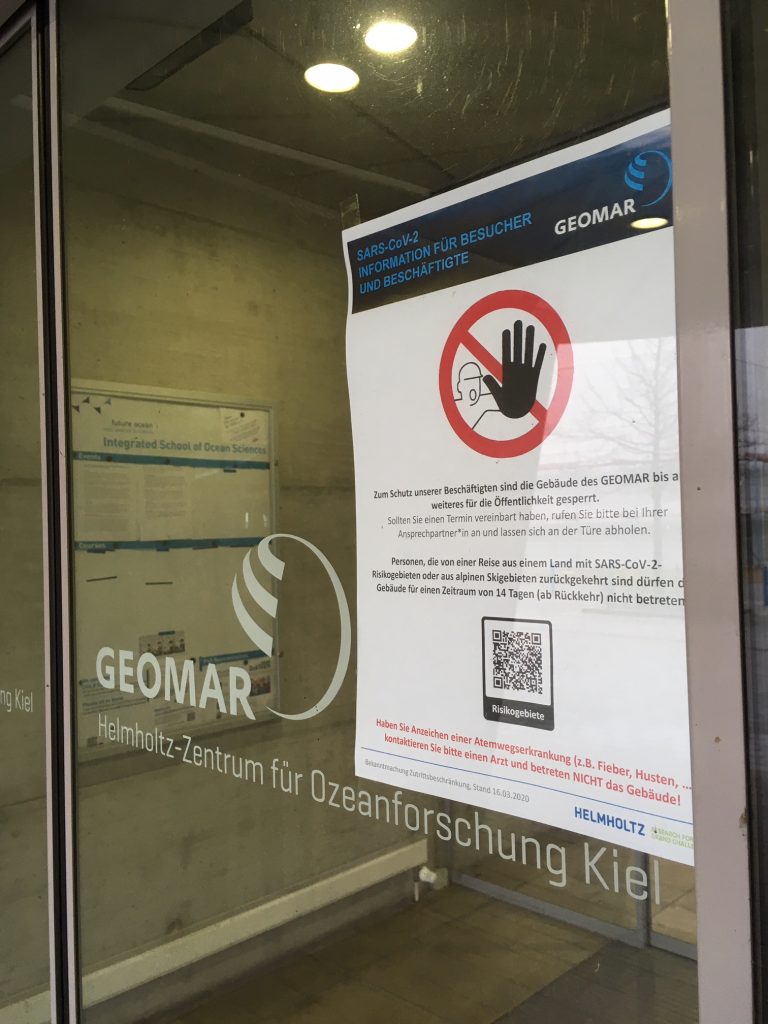(English below)
In den vergangenen Tagen haben uns mehrmals Fragen erreicht, wie es aktuell mit der Meeresforschung weitergeht, was mit Expeditionen passiert usw. Natürlich können wir hier in diesem Blog nur Aussagen für die Kieler Meeresforschung treffen, heute noch genauer zum GEOMAR. Aber ein paar Antworten wollen geben. Dafür hole ich ein bisschen aus.
Als die ALKOR am 5. März den Hafen von Malaga (Spanien) verließ, war die Welt schon nicht mehr in Ordnung. In China waren nachweislich mehr als 80.000 Menschen an COVID-19 erkrankt, das öffentliche Leben in mehreren Provinzen war komplett lahmgelegt. In Italien gab es knapp 4000 bestätigte Fälle von SARS-CoV-2-Infektionen, etwa 150 Menschen waren dort schon an COVID-19 gestorben. In Deutschland lag die Zahl der bestätigten Infektionen allerdings noch unter 400. Und zu diesem Zeitpunkt konnten sich wohl nur die wenigsten Menschen vorstellen, wie sehr das neue Virus und die dagegen ergriffenen Maßnahmen schon bald unser aller Leben verändern würden.
Das deutsch-portugiesisch-dänisch-estnisch-belgische Team der ALKOR-Expedition AL534/2 konnte das Schiff Anfang März jedenfalls noch problemlos erreichen und auch auslaufen.
Gleiches gilt für das deutsch-portugiesischen Team unter GEOMAR-Leitung, das am 6. März mit dem Forschungsschiff METEOR den Hafen von Ponta Delgada (Azoren, Portugal) Richtung mittelatlantischer Rücken verließ.
Die ALKOR fuhr anschließend entlang der Küste Westeuropas langsam Richtung Norden. Die Expedition war Teil des Projekts HOTMIC, das offiziell am 1. April gestartet ist. HOTMIC will den Weg von Plastikmüll – vor allem von Mikroplastik – vom Kontinent bis zu den großen ozeanischen Wirbeln verfolgen (mehr dazu in der verlinkten Pressemitteilung oder im HOTMIC-Blog). Die ALKOR-Expedition nahm dafür den ersten Abschnitt der Plastikroute ins Visier und nahm Proben vor allem in den großen Flussmündungen wie der der Seine, der Themse oder der Elbe.
Die METEOR-Expedition dient dagegen der Erkundung möglicher Fluidaustritte am Meeresboden im Bereich der Gloria-Störung und dem Azorenplateau im zentralen Nordatlantik. Die Wissenschaftlerinnen und Wissenschaftler an Bord erwarten davon neue Erkenntnisse über die Veränderlichkeit ozeanischer Erdkruste, aber auch hinsichtlich globaler Elementkreisläufe sowie die Verbreitung spezieller Organismen-Gemeinschaften in der Tiefsee.
Neben beiden Schiffexpeditionen war Anfang März noch ein weiteres Team unter GEOMAR-Leitung in Peru im Einsatz. Von der Hafenstadt Callao aus und mit Hilfe der am GEOMAR entwickelten KOSMOS-Mesokosmen untersucht es im Rahmen des Projekts CUSCO, wie sich der Klimawandel auf das biologisch äußerst produktive Upwellingsystem vor der Küste Perus auswirken kann (Mehr Informationen dazu im CUSCO-Blog).
Doch während die Expeditionen und Experimente liefen, breitete sich das SARS-CoV-2-Virus rasend schnell aus. Am 11. März erklärte die WHO den Zustand einer Pandemie. Länder schlossen ihre Grenzen, Flugverbindungen wurden gestrichen. Die deutsche Bundesregierung und die Bundesländer beschlossen am 22. März weitgehende Kontaktverbote.
Das GEOMAR hat natürlich ebenfalls Maßnahmen ergriffen: Veranstaltungen und Besucherführungen finden derzeit nicht statt, das Aquarium bleibt bis auf weiteres geschlossen. Der Zugang zu öffentlichen Bereichen des GEOMAR wurde für Besucherinnen und Besucher eingeschränkt. Viele Kolleginnen und Kollegen arbeiten derzeit im Homeoffice. Auch wir (Abteilung Kommunikation und Medien) arbeiten jetzt weitgehend von zuhause aus – sind aber für Anfragen nach wie vor erreichbar.
Kann die Forschung trotzdem weitergehen? Ja, sie kann, aber natürlich mit Einschränkungen. Die Kolleginnen und Kollegen auf See erleben dank ihrer mehrere Wochen dauernden Fahrten eine Art Quarantäne. Am Freitag, 27.3., kehrte die ALKOR nach drei Wochen auf See wie geplant nach Kiel zurück. An Bord alle wohlauf. In Kiel konnten die Forscherinnen und Forscher ihre Proben und Geräte ausladen – allerdings mit möglichst wenig Kontakt zu den Kolleginnen und Kollegen an Land. Eigentlich sollten die Proben, die teilweise gekühlt gelagert werden müssen, sofort an die beteiligten Institute in Dänemark, Estland, Portugal und Belgien verteilt werden. Das ist derzeit nicht so einfach. Deshalb haben andere Arbeitsgruppen und das Zentrale Probenlager am GEOMAR entsprechende Lagerkapazitäten zur Verfügung gestellt.
Die METEOR ist aktuell noch auf See. Auch dort gilt: An Bord sind alle wohlauf.
Einige andere Expeditionen, die für die erste Jahreshälfte geplant waren und für die zum Beispiel weite Anreisen nötig gewesen wären, mussten leider schon abgesagt werden.
Wie die Situation in Peru aussieht, hat der Projektleiter vor einigen Tagen in einem Interview mit GEO.de erklärt.
Die Situation ist dynamisch, deshalb lässt sich nicht alles in einem Blogpost erklären, beschreiben, vorhersagen. Aber wir halten Euch auf dem Laufenden. Wenn Ihr Fragen habt, nutzt gern die Kommentarfunktion.
Bleibt gesund!
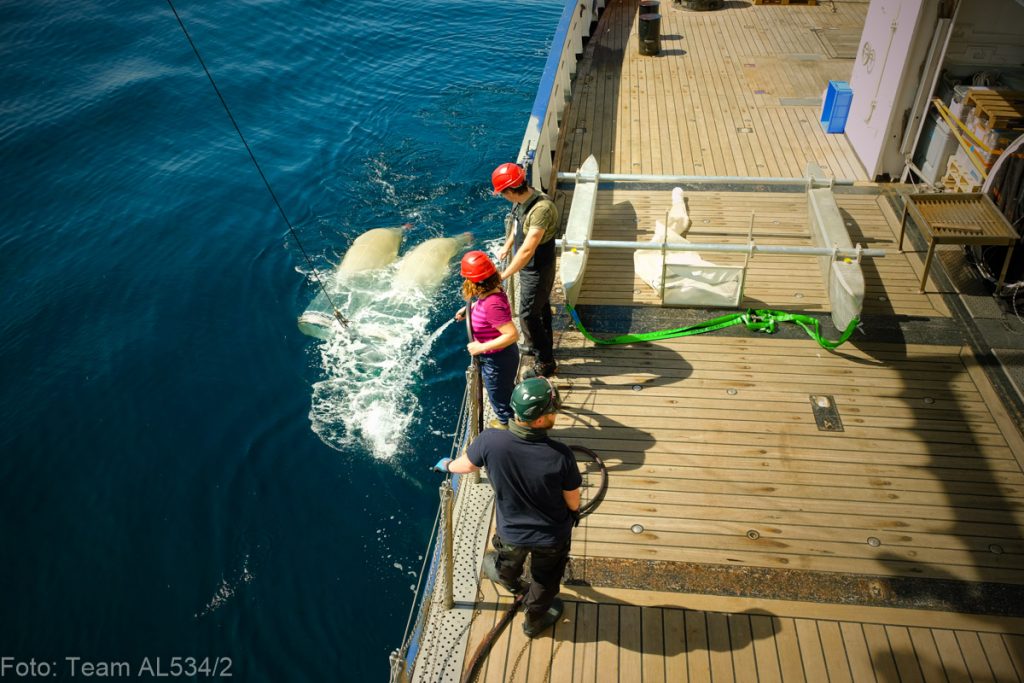
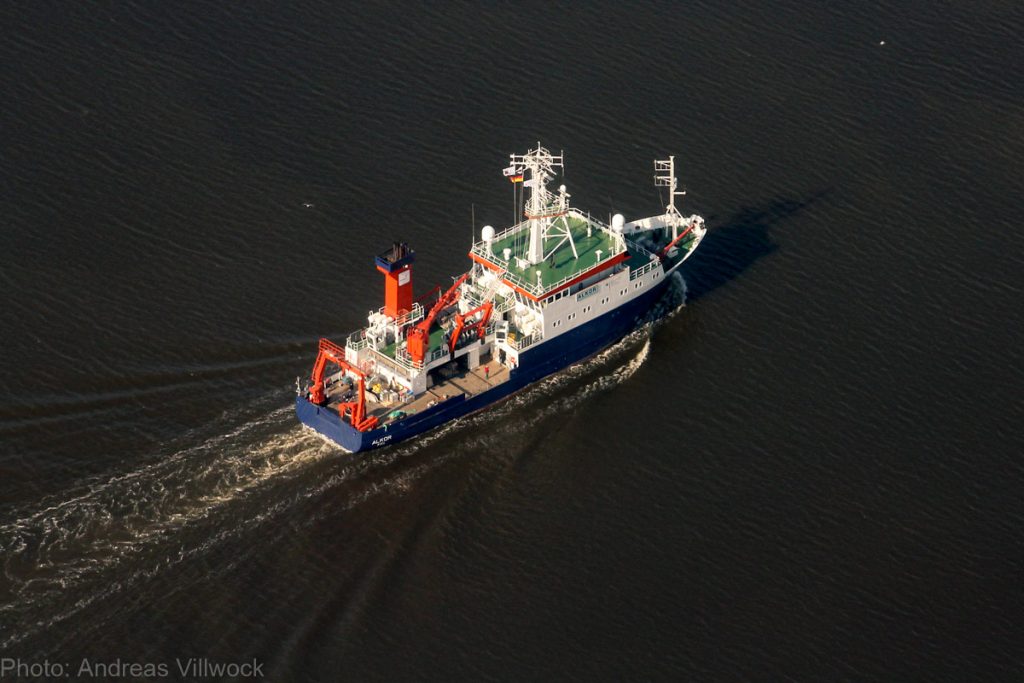
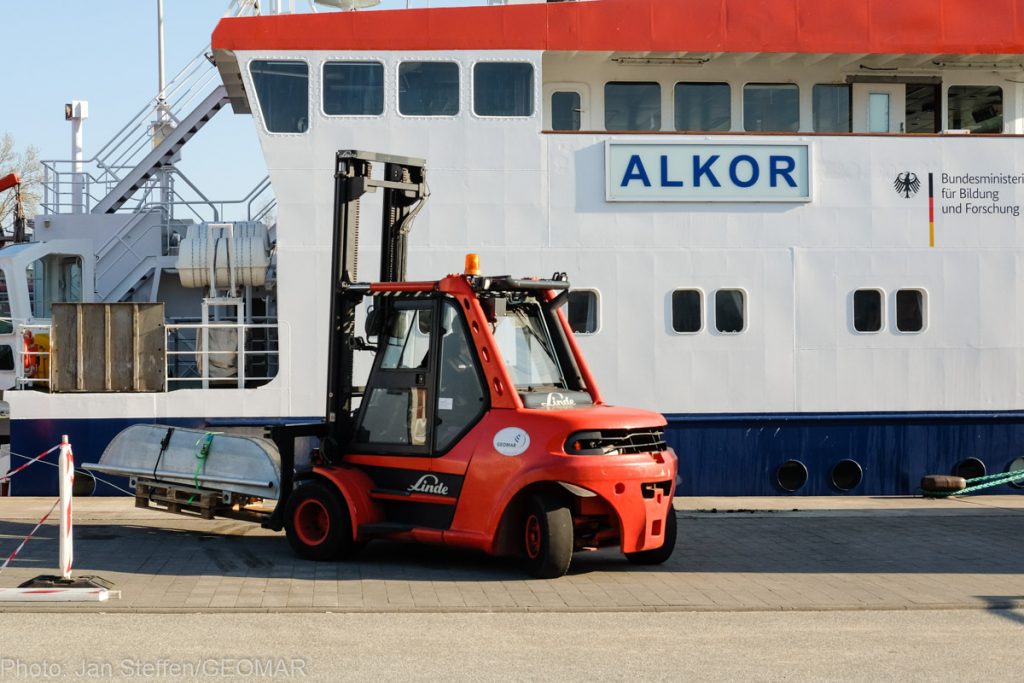
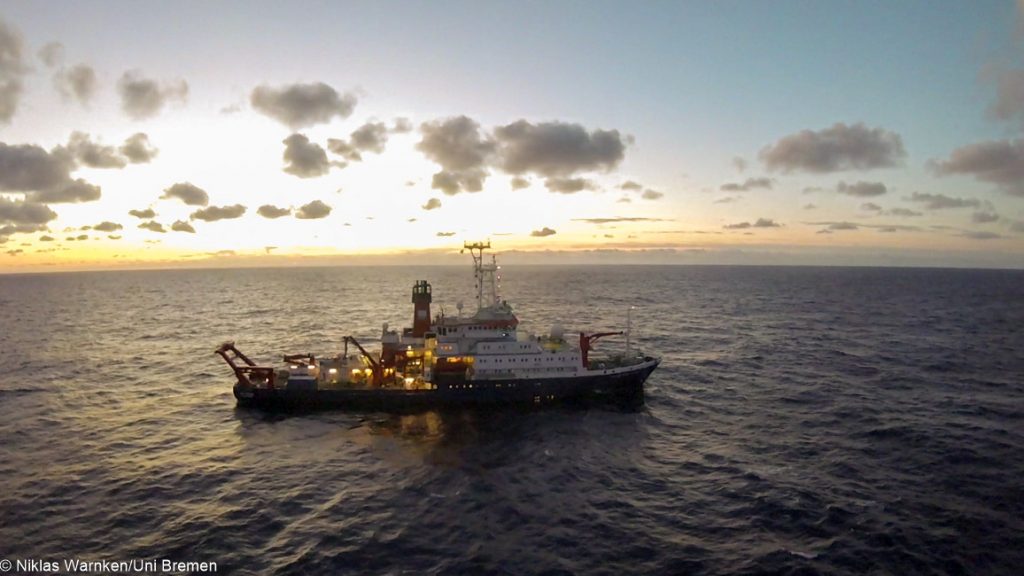
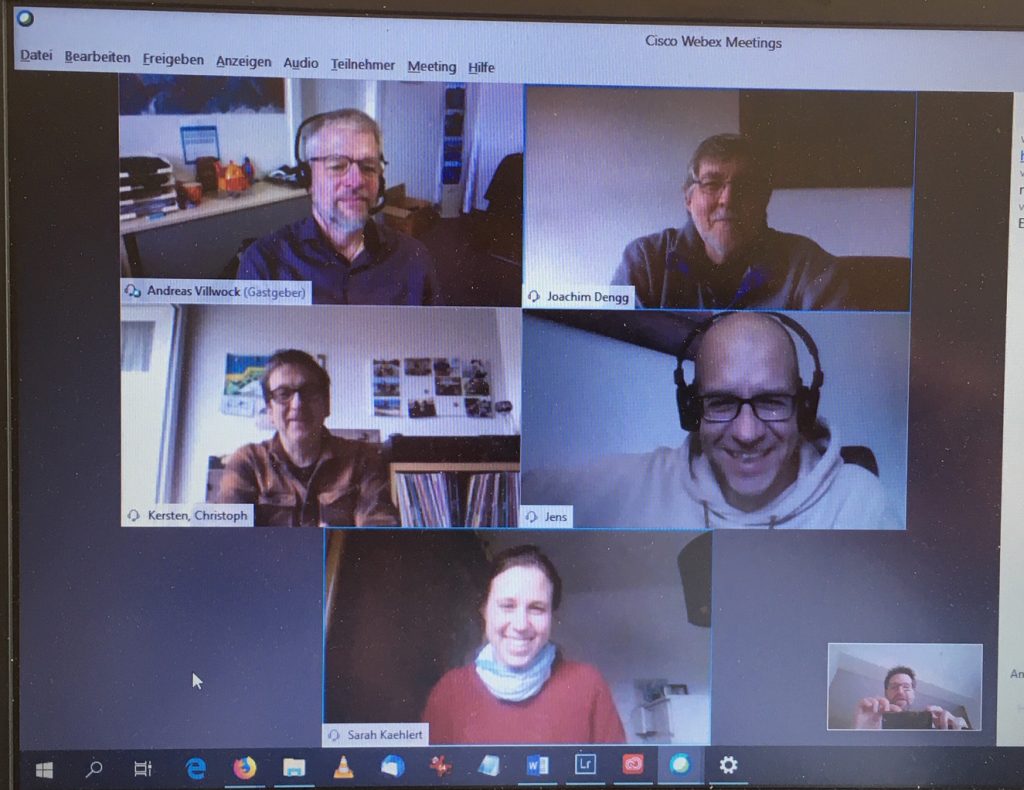
Marine research in times of pandemic
In the past few days we have received several questions about the current state of marine research, what is happening with expeditions, etc. Of course we can only make statements here in this blog for the marine research in Kiel, today even more precisely for GEOMAR. But we want to give some answers. Therefore I will go a little further.
When the ALKOR left the port of Malaga (Spain) on 5 April, the world was already out of order. In China, more than 80,000 people were proven to have been infected with COVID-19 and public life in several provinces was completely paralysed. In Italy almost 4000 confirmed cases of SARS-CoV-2 infection were reported, about 150 people had already died of COVID-19 there. In Germany, however, the number of confirmed infections was still less than 400, and at that time only very few people could have imagined how much the new virus and the measures taken to combat it would soon change all our lives.
The German-Portuguese-Danish-Estonian-Belgian team of the ALKOR expedition AL534/2 was able to reach the ship without any problems at the beginning of March. The same applies to the German-Portuguese team under GEOMAR leadership which left the port of Ponta Delgada (Azores, Portugal) with the research vessel METEOR on 6 March in the direction of the Mid-Atlantic Ridge.
The ALKOR sailed slowly north along the coast of Western Europe. The expedition was part of the HOTMIC project, which officially started on 1 April. HOTMIC aims to trace the path of plastic waste – especially microplastics – from the continent to the large oceanic gyres. To this end, the ALKOR expedition targeted the first section of this plastic route and took samples mainly in the large river mouths such as the Seine, Thames or Elbe.
The METEOR expedition, on the other hand, aims at investigating of fluid emanation sites on the sea floor in the area of the Gloria fault and the Azores plateau in the central North Atlantic. The scientists on board expect new insights into the alterartion of the Earth’s oceanic crust, but also into global elemental cycles and the distribution of special communities of organisms in the deep sea.
In addition to both ship expeditions, another team under GEOMAR leadership was working in Peru at the beginning of March. From the port city of Callao and with the help of the KOSMOS mesocosms developed at GEOMAR, the team is investigating, as part of the CUSCO project, how climate change may affect the biologically highly productive upwelling system off the coast of Peru (for more information follow the CUSCO blog).
But while the expeditions and experiments were going on, the SARS CoV-2 virus spread at an alarming rate. On 11 March, the WHO declared a pandemic. Countries closed their borders and flight connections were cancelled. On 22 March, the German Federal Government and the federal states decided on extensive contact bans. GEOMAR had of course also taken measures. At the moment, there are no events and guided tours for visitors, the aquarium is closed until further notice. Access to public areas of the GEOMAR has been restricted for visitors. Many colleagues are currently working in the home office. We (Communication and Media Department) now also work mainly from home – but are still available for enquiries.
Can research continue nevertheless? Yes, it can, but of course with restrictions. The colleagues at sea are experiencing a kind of quarantine thanks to their journeys, which last several weeks.
On Friday, the ALKOR returned to Kiel as planned after three weeks at sea. Everyone on board was in good health. In Kiel, the researchers were able to unload their samples and equipment – but with as little contact as possible with their colleagues on land. Actually, the samples, some of which have to be stored in a cool place, should have been distributed immediately to the participating institutes in Denmark, Estonia, Portugal and Belgium. This is not so easy at present. Therefore, other working groups and the central sample storage at GEOMAR have provided appropriate storage capacity.
The METEOR is currently still at sea and will probably return directly to Germany. There, too, everyone on board is in good health.
Some other expeditions, which were planned for the first half of the year and for which, for example, long journeys would have been necessary, have unfortunately been cancelled already.
How the situation in Peru looks like, the project manager explained in an interview with GEO.de a few days ago. (in German)
The situation is dynamic, so not everything can be explained, described, predicted in a single blog post. But we will keep you up to date. If you have questions, please use the comment function.
Stay healthy!
